News
Trump Is Using “Unitary Executive” Theory in His Bid to Amass Supreme Power

Trump is claiming total executive power that would eclipse the legislative “co-equal” branch of government.

In the weeks since the presidential election, president-elect Donald Trump and his allies have made a series of moves that indicate their intent to dangerously consolidate executive power under the controversial “unitary executive” theory of the Constitution.
During the presidential campaign, Trump posted a video on Truth Social that referred to his second administration as a “unified Reich,” invoking Adolph Hitler’s Third Reich in Nazi Germany. As president-elect, Trump’s cabinet selections have corroborated his campaign pledge to be a dictator on day one.
With the backdrop of the Supreme Court’s decision granting him absolute immunity from criminal prosecution for his core “official” functions, and the 920-page “Project 2025” right-wing blueprint for an autocratic government, Trump is positioning himself to change the balance of power by increasing the president’s authority over all aspects of the executive branch — and thereby becoming a “unitary executive.”
The framers of the Constitution created a tripartite system of government with three overlapping and co-equal branches to check and balance each other. But the unitary executive paradigm would elevate the executive above the legislative branch. It says that the executive branch is “unitary” — that is, the president has complete command and control over it.
The Roots of the “Unitary Executive” Theory
The unitary executive theory has its roots in the “imperial presidency” during the Civil War and reached its zenith during the Nixon administration. In 1862, President Abraham Lincoln suspended the writ of habeas corpus without congressional authorization. President Richard Nixon, who ultimately resigned for his lawbreaking during the Watergate scandal, famously declared, “When the president does it … that means that it is not illegal.”
In 1988, in Morrison v. Olson, the Supreme Court upheld a provision of the 1978 Ethics in Government Act — passed in the wake of Watergate — that said a special prosecutor could be removed by the president only for good cause. This was an implicit rejection of the unitary executive theory. Antonin Scalia wrote a solitary dissent in which he maintained that the Constitution’s Article II Vesting Clause (that says, “The executive power shall be vested in a President of the United States”) “does not mean some of the executive power, but all of the executive power.”
During the George W. Bush administration, John Yoo, one of the primary authors of the “torture memos,” elevated the unitary executive model to a central tenet of the Bush presidency. Yoo told New Yorker writer Jane Mayer that Congress couldn’t prevent the president from ordering torture. When asked if any law prohibited the president from crushing the testicles of a child during interrogation of their parent, Yoo responded, “I think it depends on why the president thinks he needs to do that.” But torture is absolutely prohibited by U.S. and international law.
Seeking to empower the president to override the will of Congress, Yoo inserted the phrase “unitary executive” into Bush’s signing statements attached to legislation, in which the president reserved the right to disobey any parts of congressional statutes with which he disagreed.
Samuel Alito, while serving as Deputy Assistant Attorney General in the Reagan administration, supported the unitary executive theory. He stated at his Supreme Court confirmation hearing in 2006: “The concept of unitary Executive doesn’t have to do with the scope of Executive power. It has to do with who within the Executive branch controls the exercise of Executive power, and the theory is the Constitution says the Executive power is conferred on the President.”
William Barr, Trump’s attorney general in his first administration, subscribed to the unitary executive theory. In 2018, before Trump appointed him, Barr wrote a memo criticizing special counsel Robert Mueller’s investigation of Trump. In it, Barr maintained that the president has total control over the executive branch. “Constitutionally, it is wrong to conceive of the President as simply the highest officer within the Executive branch hierarchy. He alone is the Executive branch: As such, he is the sole repository of all executive powers conferred by the Constitution.”
Supreme Court members Neil Gorsuch and Brett Kavanaugh both favor the unitary executive model. “The regrettable fact is that the judiciary at the moment seems inclined to recognize that the president does have this kind of authority,” Peter L. Strauss, emeritus professor of law at Columbia University, told The New York Times. “They are clawing away agency independence in ways that I find quite unfortunate and disrespectful of congressional choice.”
Proponents of the unitary executive say that Article II establishes a “hierarchical, unified executive department under the direct control of the President” who “alone possesses all of the executive power and … therefore can direct, control, and supervise inferior officers or agencies who seek to exercise discretionary executive power.”
Project 2025 Is Anchored in the Unitary Executive Scheme
Project 2025, the right wing’s roadmap to an imperial presidency, is anchored in the unitary executive scheme. “This radical governing philosophy, which contravenes the traditional separation of powers, vests presidents with almost complete control over the federal bureaucracy, including congressionally designated independent agencies or the DOJ and the FBI,” according to a report issued in October by Center for American Progress. “The unitary executive theory is designed to sharply diminish Congress’ imperative role to act as a check and balance on the executive branch with tools such as setting up independent agencies to make expert decisions and by limiting presidents’ ability to fire career civil servants for purely political purposes.”
As detailed in Project 2025, Trump would circumvent Congress by taking complete control of all administrative agencies that protect our health, safety, food, water, climate and labor rights. The Supreme Court ruled in June that a federal agency doesn’t have the last word on protecting these rights. When a statute is ambiguous, an agency must now defer to courts (many of which are staffed by judges appointed by Trump) instead of following interpretations of agency experts.
A plan set forth in Project 2025 calls for Trump’s second administration to reinstitute one of his previous executive orders, known as Schedule F, which Joe Biden had eliminated. This would reclassify 50,000 of the 2 million merit-based civil service employees as political appointees who serve at the pleasure of the president with no civil service protections.
Project 2025 contains several ways in which Trump could undermine the constitutional checks and balances. They include:
– Curtailing the independence of independent agencies;
– Weaponizing the Department of Justice to serve Trump’s political agenda;
– Replacing civil servants with political supporters;
– Impounding funds Congress has appropriated and using them for other purposes;
– Neutralizing the press and independent media;
– Misapplying the Insurrection Act to suppress protests and deport undocumented immigrants;
– Misusing the recess appointment process to confirm executive branch nominees without Senate approval; and
– Deconstructing the administrative state to help corporations maximize profits.
Trump’s Cabinet Nominees Will Be Loyal Foot Soldiers in His Imperial Presidency
When Project 2025 became politically unpopular during the presidential campaign, Trump tried to disassociate himself from it. In a July 5 post on Truth Social, he wrote, “I know nothing about Project 2025.” But now that he is president-elect, Trump’s denials ring hollow. Several of his cabinet nominees are authors and influencers of Project 2025.
Trump has once again tapped Russell Vought, president of the Center for Renewing America, as director of the Office of Management and Budget. Vought oversaw Project 2025’s section on expanding executive power.
Brendan Carr, who wrote Project 2025’s chapter on the Federal Communications Commission, is Trump’s pick to chair the FCC. Carr has pledged to retaliate against media organizations that criticized Trump during the election campaign.
Tom Homan will be Trump’s new “border czar.” Immigration hawk Stephen Miller will serve as deputy chief of policy. John Ratcliffe is Trump’s choice for CIA Director. And Peter Hoekstra will be ambassador to Canada. All are associated with Project 2025.
The Supreme Court’s Presidential Immunity Decision Effectively Places Trump Above the Law
In July, a six-member reactionary supermajority of the Supreme Court held in Trump v. United States that presidents have absolute immunity from criminal prosecution for core official acts, and presumptive immunity for all other official acts. “Unlike anyone else, the President is a branch of government, and the Constitution vests in him sweeping powers and duties,” Chief Justice John Roberts wrote for the majority.
“In every use of official power, the President is now a king above the law,” Sonia Sotomayor wrote in dissent. “The court effectively creates a law-free zone around the president, upsetting the status quo that has existed since the founding.” The immunity the court established now “lies about like a loaded weapon” for any president to use for his own political gain or financial interests, with the knowledge that he is inoculated from criminal liability.
Ketanji Brown Jackson, in her separate dissent, also warned that presidents would become kings under the court’s ruling. “The majority of my colleagues seems to have put their trust in our Court’s ability to prevent Presidents from becoming Kings through case-by-case application of the indeterminate standards of their new Presidential accountability paradigm,” she wrote. “I fear that they are wrong.” The court has declared for the first time that “the most powerful official in the United States can . . . become a law unto himself.”
As a result of Trump v. U.S., Trump’s election victory, and the Justice Department’s policy against prosecuting sitting presidents, Trump’s criminal cases — comprising 91 charges — are evaporating.
Congress Is Poised to Pass a Bill to Allow Trump to Punish His Political Opponents
Congress is poised to pass legislation that would give Trump broad authority to punish his political opponents. Dubbed the “nonprofit killer” bill, it would empower the Secretary of the Treasury to designate any nonprofit group as a “terrorist supporting organization” and revoke its tax-exempt status, which would effectively shut it down with no due process.
The House of Representatives has already passed H.R. 9495 — the Stop Terror-Financing and Tax Penalties on American Hostages Act — and it will likely be re-introduced and passed by that chamber again in the next congressional term. When the GOP takes control of the Senate, it will probably pass the bill as well.
Aimed primarily at organizations that support the Palestinian struggle, the legislation could be utilized to shutter any group that opposes Trump’s policies. “This bill is not about terrorism — it’s about giving Donald Trump unlimited authority to label his opponents as terrorists,” Rep. Lloyd Doggett, D-Texas, said on MSNBC.
If enacted, the legislation would dovetail with Trump’s Project 2025-inspired plan to remake the U.S. government in his authoritarian image. If this comes to pass, Trump will be the unitary executive on steroids.
News
Trump Nominates Conservative Lawyer Harmeet Dhillon To Lead DOJ Civil Rights Division
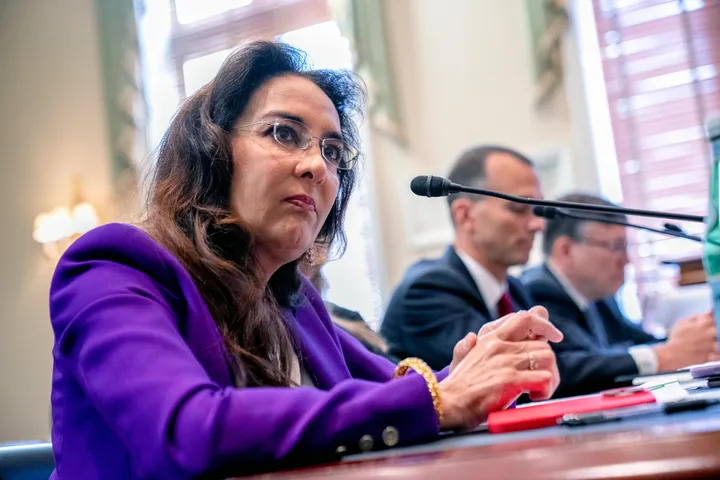
Harmeet Dhillon was chosen by the president-elect to replace Kristen Clarke on the Justice Department’s civil rights efforts.
President-elect Donald Trump announced on Monday that he plans to nominate a conservative California attorney to lead a critical division of the Department of Justice.
Harmeet Dhillon, a former vice chairwoman of the California GOP and a national committeewoman for the Republican National Committee, was selected by Trump to serve as assistant attorney general for civil rights at the Justice Department. She would replace Kristen Clarke, who became the first woman and first Black woman to run the division in 2021.
Trump, who described Dhillon as one of the “top Election lawyers” in the country in his Truth Social announcement, said that she would have a large role in voting rights enforcement.
“Throughout her career, Harmeet has stood up consistently to protect our cherished Civil Liberties, including taking on Big Tech for censoring our Free Speech, representing Christians who were prevented from praying together during COVID, and suing corporations who use woke policies to discriminate against their workers,” he wrote.
Dhillon combated stay-at-home orders during the COVID-19 pandemic. She filed several lawsuits against government-level regulations, arguing there was overreach. The lawsuits Dhillon filed came after Democratic California Gov. Gavin Newsom became the first governor to issue statewide stay-at-home orders to shut down nonessential activities and interests to combat the spread of the coronavirus.
In 2018, Dhillon founded the conservative nonprofit The Center for American Liberty, which has filed lawsuits challenging vaccine requirements and trans-inclusive school policies. Most notably, Dhillon currently represents Chloe Cole, a young activist who sued Kaiser Permanente in California after she detransitioned from male to female. Cole has rallied alongside Republican politicians and conservative media figures, and has testified in support of dozens of state laws restricting access to gender-affirming care for trans youth.
Dhillon is highly critical of blue states that aim to uphold and protect rights for transgender people in light of ongoing legislative attacks. She said Maine’s “shield” law, which protects reproductive health care providers and trans people, is “unconstitutional” and expressed concerns about future protections in California.
A staunch opponent of abortion herself, the attorney also unsuccessfully represented anti-abortion activist David Daleiden, who in 2016 used a fake driver’s license to pose as a biomedical company executive and tried to buy fetal tissue from Planned Parenthood, in an effort to accuse the health care provider of selling tissue for profit.
Dhillon, who was born in India and is a practicing Sikh, has faced pushback from fellow Republicans due to questions of her faith. After she announced in 2022 that she would challenge RNC Chair Ronna McDaniel for her position, several members of the RNC circulated a video of Dhillon opening a 2016 Republican National Convention with a Sikh prayer. In a letter to Alabama Republicans in 2023 responding to the incident, Dhillon addressed concerns about her faith and slammed McDaniel’s leadership. Alabama Republican Chris Horn questioned how Dhillon’s religion would impact policy to NBC. McDaniel condemned attacks on religion but told Politico her allies questioned how Dhillon’s faith would impact the party.
Last year, former Fox News host and conservative political commentator Tucker Carlson hired Dhillon to represent him in a gender discrimination lawsuit by his former producer, Abby Grossberg. The ensuing settlement resulted in Fox paying Grossberg $12 million.
“I’m extremely honored by President Trump’s nomination to assist with our nation’s civil rights agenda,” Dhillon said in a post on X (formerly known as Twitter). “It has been my dream to be able to serve our great country, and I am so excited to be part of an incredible team of lawyers led by @PamBondi. I cannot wait to get to work!”
News
Trump’s Utterly Absurd Take On Birthright Citizenship Involves Walking Infants
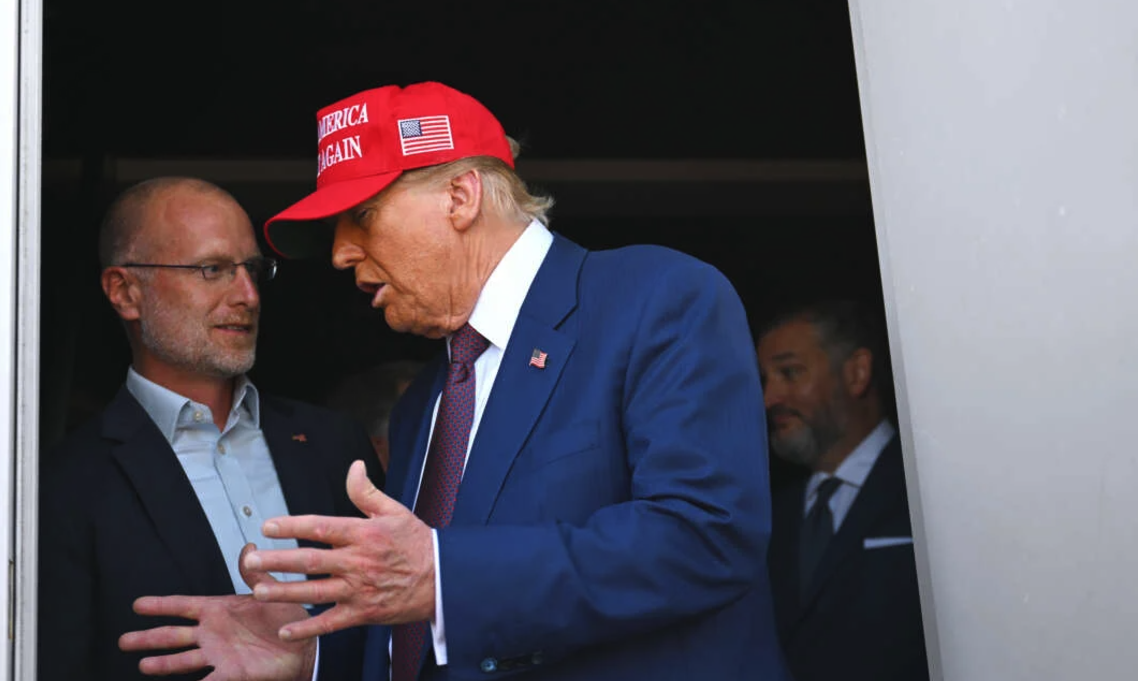
The president-elect appeared very confused about how American citizenship is conferred.
In a freewheeling interview with NBC News Sunday, President-elect Donald Trump offered a head-scratching explanation for his plan to wage an attack on birthright citizenship.
“Did you know, if somebody sets a foot — just a foot, one foot, you don’t need two — on our land, congratulations, you are now a citizen of the United States of America,” Trump said, when discussing birthright citizenship.
“Yes, we’re going to end that, because it’s ridiculous,” he added.
Trump appeared to describe a hypothetical scenario in which a woman would give birth to an infant who — either capable of walking at birth or helped along by someone eager to win a bet — would set one foot on American soil and the other in either Mexico or Canada.
It is also possible Trump was imagining an infant hopping or standing on one leg. Neither scenario is plausible.
Trump also repeatedly asked whether the interviewer, Kristen Welker of “Meet the Press,” knew that the United States was the only country that conferred citizenship by birthright.
“We’re the only country that has it, you know,” Trump said. “You know we’re the only country that has it.”
Birthright citizenship is commonly recognized in the Americas, including in Canada and Mexico. Also known by its Latin legal term as “jus soli,” it is the concept of conferring citizenship by birth in a given country. Most countries instead recognize “jus sanguinis,” which instead confers citizenship based on the nationality of a person’s parents.
Welker did not challenge Trump’s utterly wrong description of how birthright citizenship works or that the United States is not alone in recognizing it. But she asked whether Trump intended to enact his proposed change through executive action.
“Well, if we can, through executive action,” Trump said. “I was going to do it through executive action, but then we had to fix COVID first, to be honest with you.”
Birthright citizenship is protected by the 14th Amendment to the Constitution. The president cannot use executive action to overturn a constitutional amendment, though legal experts expect the Trump administration to challenge the long-settled legal interpretation through the courts.
Trump has spent significant time in southern Florida, which is home to a large Cuban-American community.
He likely came up with this weird description of birthright citizenship by free-associating the issue with the now-defunct policy of allowing Cuban migrants to stay within the United States and pursue citizenship upon touching American soil. The policy was known as “wet-foot, dry-foot.”
During this year’s presidential campaign, Trump repeatedly described immigrants as coming from jails and mental institutions. He was likely resurrecting assertions he heard during the era of the Mariel boatlift four decades ago.
News
Trump Trolls Canadian Prime Minister Justin Trudeau, Stirs Controversy
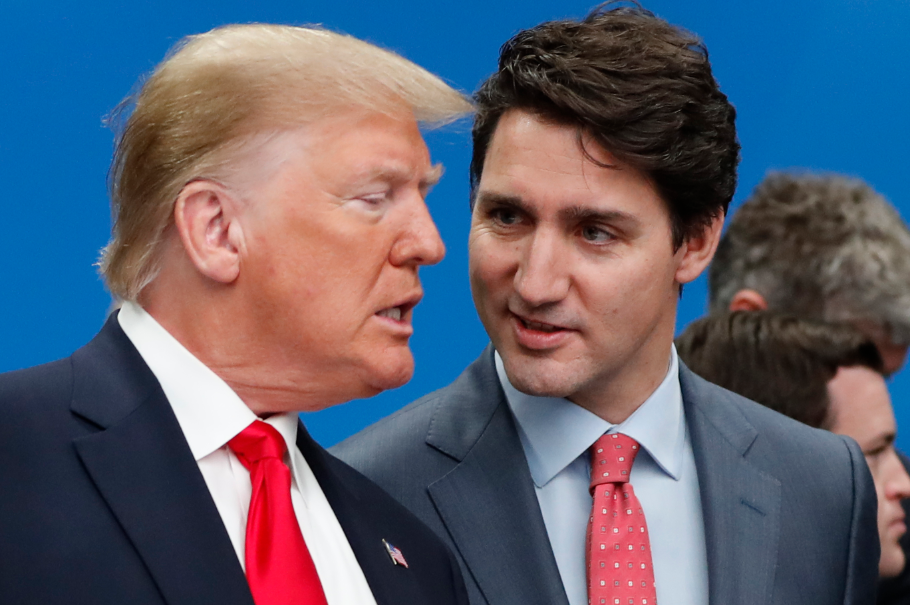
Trump mocks the United States’ northern ally
In a post just after midnight on Truth Social, Trump took aim at Canadian Prime Minister Justin Trudeau with a mocking reference, calling him “Governor Justin Trudeau of the Great State of Canada.”
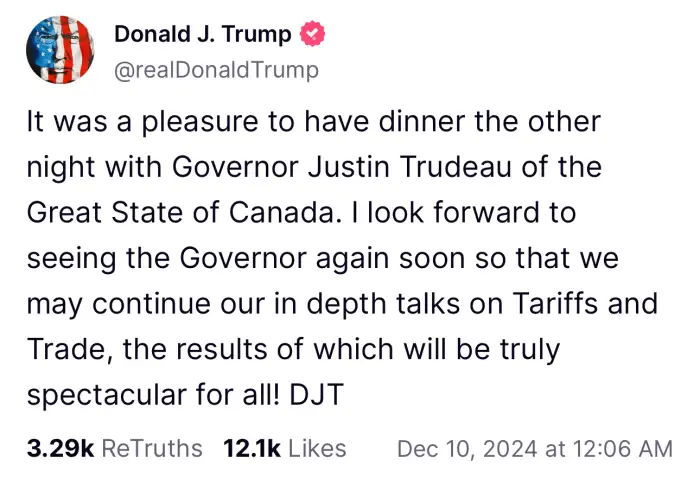
The comment, a throwback to Trump’s past suggestion that Canada might become the 51st U.S. state if they can’t handle his tariffs, is an insult to both Trudeau and Canada.

Trump recently posted an AI image of himself looking into Canada as if to annex it. Trump’s midnight post, claiming to look forward to future discussions on tariffs and trade with “Governor Trudeau,” further stoked tensions with a key ally and makes one question his diplomatic judgment.
Trump’s post undermines the United States’ relationship with Canada. Calling the Canadian leader a “Governor” belittles the sovereignty of a close neighbor and trading partner, and further feeds into the narrative of disrespect that Trump has often displayed toward foreign leaders.
The United States and Canada share deep economic, cultural, and geopolitical ties, and statements like this can jeopardize decades of cooperation. Trump is proving once again he will be an embarrassment to the United States.
-
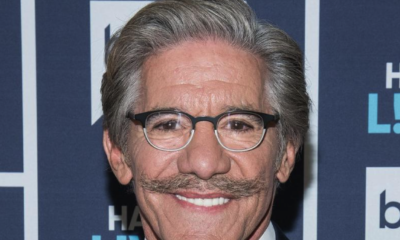
 News11 months ago
News11 months agoGeraldo Rivera Slaps Trump Supporters With A Reality Check After Biden’s Pardon
-
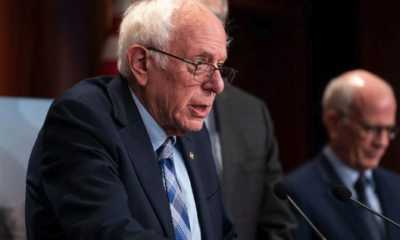
 News11 months ago
News11 months agoBernie Sanders Flips The Script And Praises Trump Picks
-

 Uncategorized11 months ago
Uncategorized11 months agoNaked RFK Jr. Makes Cameo On Wife Cheryl Hines’ Social Media
-

 News11 months ago
News11 months agoPhoto of person of interest with the mask down was the “money shot,” police commissioner says
-
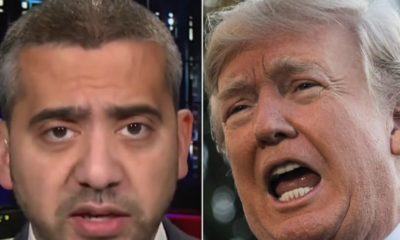
 News11 months ago
News11 months ago‘Banana Republic Stuff’: Mehdi Hasan Nails GOP Hypocrisy Over Trump’s Latest Move
-
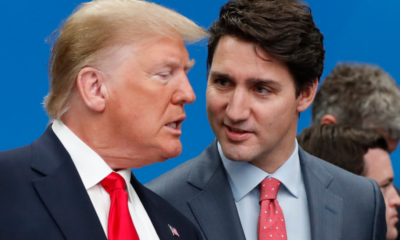
 News11 months ago
News11 months agoBREAKING: Canada just stunned Trump with brutal news after holding an “emergency meeting.” This WON’T end well for Trump…
-
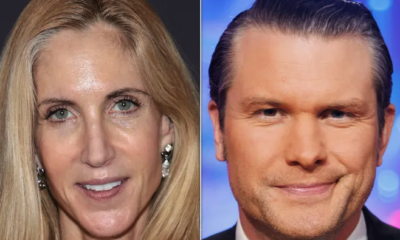
 News11 months ago
News11 months agoAnn Coulter Slams Controversial Trump Cabinet Nominee As ‘Sleazy’ Serial Adulterer
-
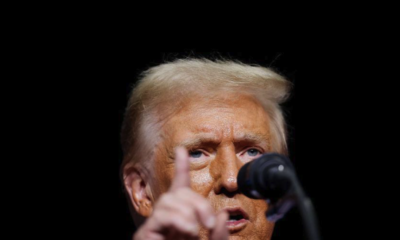
 News11 months ago
News11 months agoTrump Is Using “Unitary Executive” Theory in His Bid to Amass Supreme Power






